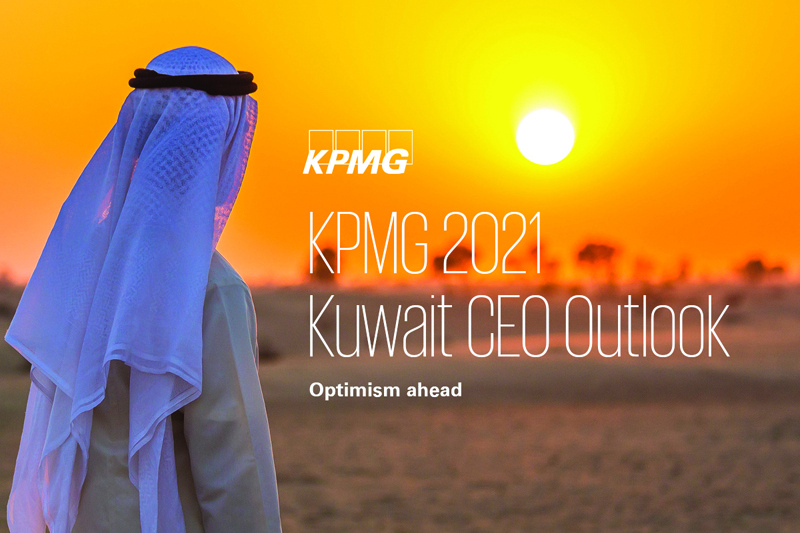KUWAIT: The first edition of KPMG 2021 Kuwait CEO Outlook presents thoughts, perspectives, strategies, and concerns from 30+ CEOs in Kuwait. The survey, conducted through August and September this year, provides quantitative and qualitative insights from several market leaders across various sectors in Kuwait.
Overall, our results show that Kuwait's CEOs are starting to feel optimistic and confident, expecting aggressive growth. 96 percent of the CEOs interviewed are confident of their company's growth in the coming 1-3 years, with 88 percent of CEOs stating that they are looking to make acquisitions in the next three years to help grow and transform their businesses. To further drive their organization's growth prospects, about 72 percent of the CEOs are resorting to inorganic measures such as strategic alliances with third parties (16 percent), M&A (32 percent), joint ventures (20 percent), and outsourcing (4 percent).
Speaking about the overall findings from the report, Dr Rasheed Al-Qenae, Managing Partner - KPMG in Kuwait, said, "It's great to see that optimism is finally returning to boardrooms after 18 months of the COVID-19 pandemic. CEOs are pushing towards growth and want to get back to the pace their organizations were moving 18 months ago. They are people-centric and purpose-driven, with brand value at the heart of their operations.
COVID-19 forced CEOs to think beyond business, and this is reflected in our findings with social issues such as diversity and inclusiveness, climate change, and ESG now part of the boardroom conversation. The Kuwait government's successful vaccination program has boosted the return-to-office for businesses in the country, and our results indicate that nearly 65 percent of the CEOs are ready to bring back their staff to the office."
Key findings
The road to renewal
Despite the continuing uncertainties, our findings reflect the growth expectations and optimism among the CEOs. The research found that 92 percent plan on increasing their headcount over the next three years, with close to 32 percent planning an increase of more than 6 percent. There is a strong focus on introducing new technologies as 80 percent of CEOs interviewed are prioritizing technology investment when pursuing growth.
The research shows that CEOs are also planning what it will take to succeed in the mid-to long term. 52 percent say that they intend to invest in disruption detection and innovation processes, and that this is essential to enable teams to think disruptively. 68 percent of the CEOs said that rather than waiting to be disrupted by competitors, they are actively disrupting the sector in which they operate.
Changing sentiment
Only 8 percent of the CEOs interviewed intend to reduce their physical footprint or office space. Furthermore, 28 percent of the CEOs said that their organizations would exercise two or more days of remote work flexibility for most of their employees, with 48 percent looking to channel their investment toward a shared workspace. There has also been a noticeable increase in the number of CEOs looking to tap into a wider talent pool, with up to 32 percent looking to hire talent that operates predominantly remotely.
Shifting focus
CEOs are cognizant of the worldwide focus on socio-economic, social, and environmental issues. Our report finds a significant focus on the S in ESG, with 96 percent of the CEOs saying, 'our response to the pandemic has caused our focus to shift toward the social component of our ESG program.' Speaking about the ESG agenda, Karen Watts, Risk Partner and Head of Corporate Reporting, KPMG in Kuwait, said, "Over the course of the pandemic, we witnessed an increased focus on sustainability issues and the race to net zero. These issues will require strong collaboration between business and government.
It is good to see that CEOs are looking to devote significant capital to becoming more sustainable, with 72 percent of CEOs planning to invest more than 10 percent of revenues to their efforts to become sustainable. CEOs need to include investment in digital solutions to successfully negotiate sustainability opportunities and risks and to discover how ESG initiatives can directly drive revenue growth through innovative new products and services."
The findings indicate that 76 percent of the CEOs are seeing a rise in stakeholder demand for greater transparency in ESG-related reports. 80 percent of the CEOs agree that it will be a challenge for businesses to achieve net-zero without government stimulus. Additionally, 72 percent say that COP26 will play a key role in pushing climate change up the list of corporate agendas.
Tax reforms
CEOs are more worried about regulatory and tax risks than they were before the pandemic. The survey found that 80 percent of the CEOs recognize the vital link between the public's trust in their businesses and their tax approach. 76 percent of the CEOs believe that the pandemic has put pressure on public finances, and there should be an urgency for multilateral cooperation on the global tax system. As businesses aim to build back better, a majority (60 percent) of the CEOs feel increased pressure to publicly report their tax contributions as part of their broader ESG commitments.
The risks to growth
When looking at risks to growth over three years, CEOs in Kuwait put cyber security as the no. 1 risk and agree that a robust cyber strategy will be critical to foster trust among stakeholders. More than half of the CEOs say they are focused on strengthening governance around operational resilience and enhancing the ability to recover from an incident quickly. ESG and supply chain risk are no.2 and 3 in the list. 68 percent of the CEOs say that their supply chain has been under increased stress during the pandemic. The top 5 risks to growth as selected by the CEOs are listed below.
1. Cyber security risk
2. Environmental/Climate risk
3. Supply chain risk
4. Emerging/Disruptive technology risk
5. Tax and regulatory risk











